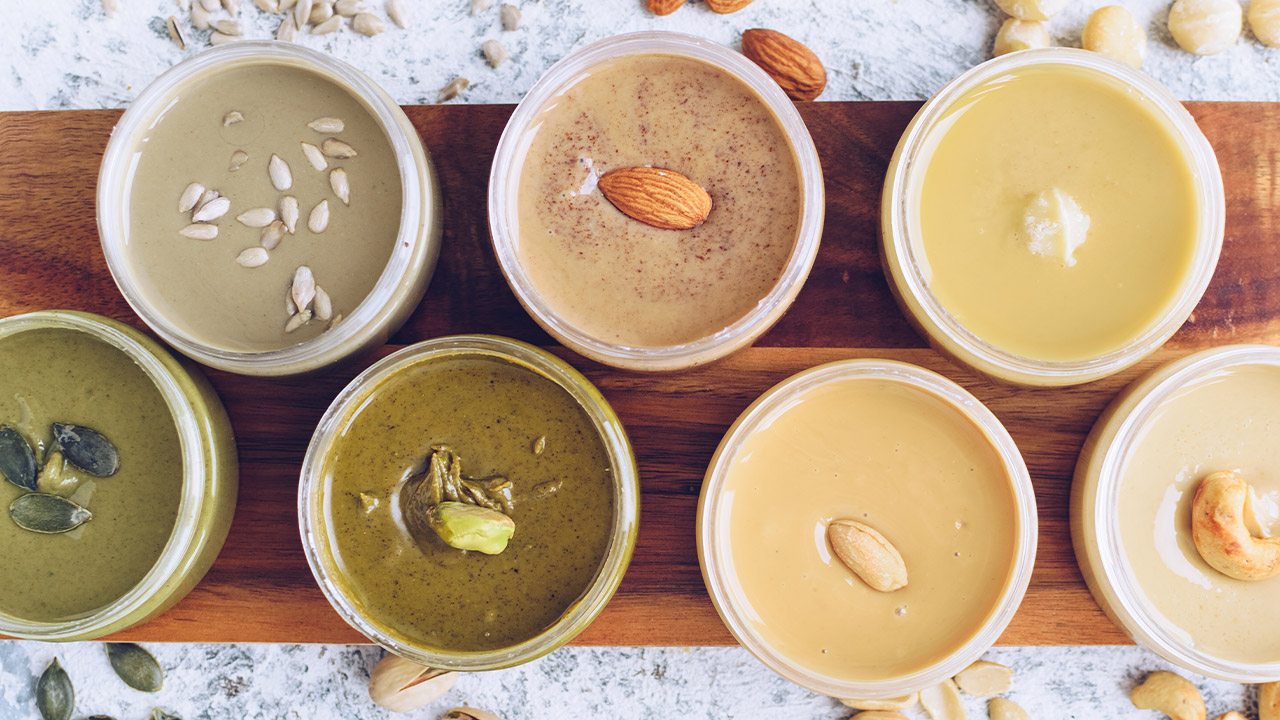The Different Alternatives to Nut Butter

Hey Angels and Alphas,
Remember when the term “nut butter” was not in the nutritional lexicon because there was pretty much just peanut butter? Good times.
But now, with the increasing prevalence of tree nut and peanut allergies, combined with the decreasing popularity of the Paleo diet (in which legumes and peanuts were forbidden,) there are countless alternatives to traditional peanut butter.
Choosing the “right” kind of butter can be a little overwhelming. But is there really a “right” one? Nutrition details can differ a bit amongst this group… so let’s talk about the details!
A QUICK NOTE ON FAT
When we’re talking about nut butter, we often talk about how they’re naturally high in fat and calories. But if you’re worried about this, this would be diet culture programming talking! The fat found in seed butter and nut butter is mainly monounsaturated fat, which actually promotes heart health and works as an anti-inflammatory.
It regulates your blood sugar, allows you to absorb fat-soluble vitamins, and helps you feel fuller after your meals. Feeling satiated after meals will aid appetite regulation and decrease the likelihood of snack cravings and hunger pangs that you would usually get after an unsatisfying meal without enough fat.
Naturally, anything that is high in fat is also high in calories. 1 gram of fat contains about 9 calories, compared to carbs and protein which all contain about 4 calories each. But take these calories with a grain of salt, and don’t be afraid to eat a fat-rich meal as it will keep you energized and satisfied for a long time.
#1 ALMOND BUTTER
Almond butter is made by bringing together ground almonds and salt and it has a milder flavor than traditional peanut butter. Since it comes from a tree nut, it is a great alternative for someone who would be allergic to peanuts.
Almond butter is definitely a nutritional powerhouse and an excellent source of healthy monounsaturated fats. Not only that, but it contains 4 more grams of monounsaturated fat per 2 tablespoons compared to your usual peanut butter, as well as higher contents of vitamin E, iron, and calcium.
#2 CASHEW BUTTER
Cashew butter is rich and creamy, but it’s also versatile enough to use in baking sweet treats or cooking savory dishes.
It’s high in monounsaturated fats, with about 13 grams every 2 tablespoon serving, and it’s slightly higher in carbs than other kinds of nut butter with about 10 grams per serving. Cashew butter is also a high-quality source of magnesium, and let’s not forget, a plant-based source of iron. Cashew butter is usually more expensive – but it’s worth it.
#3 TAHINI
Tahini is made from sesame seeds, and it’s one of the highest-quality alternatives to nut butter you can find. It’s nutty and mild, and it works very well in savory or sweet dishes.
The most popular forms of tahini are inside of hummus, but it can also be found in salad dressing, condiments, and sauces for Mediterranean dishes. It’s very high in monounsaturated fats with 16 grams per 2 tablespoons, 8 grams of protein, and it’s an amazing source of plant-based iron. Nutrition-wise, it’s a powerhouse.
#4 SUNFLOWER SEED BUTTER
Sunflower seed butter is one of the best alternatives for the people who are allergic to peanuts and tree nuts. It’s made from ground sunflower seeds mixed with salt. Sunflower seed butter has an earthy, nutty flavor.
It’s a healthy source of monounsaturated fats, and one of the richest sources of vitamin E you can find. Sunflower seed butter is pretty high in magnesium, thiamin, and zinc. It’s delicious when it’s used in combination with jelly in sandwiches such as PB&J, or just spread on a banana as a healthy snack.
THE BOTTOM LINE…
When it comes to healthy alternatives to seed butter and nut butter, you really can’t go wrong. They’re all (mostly) healthy and delicious. The examples we shared above serve to be some of the nutrition-rich options that are high in macronutrients, minerals, and vitamins. Nut and seed butter all make a satiating and blood-sugar stabilizing addition to meals, crackers, fruits, oatmeal, toast, and so much more. They all can (and absolutely should be) a part of a healthy, plant-based diet.





